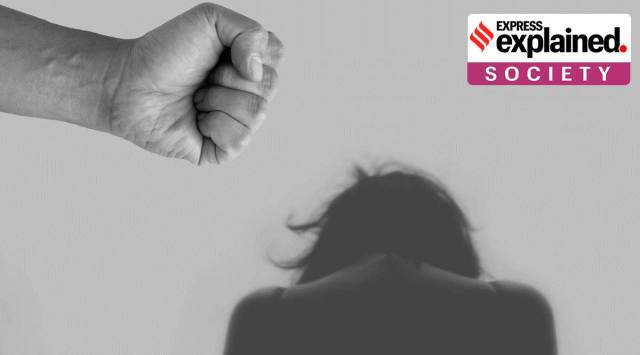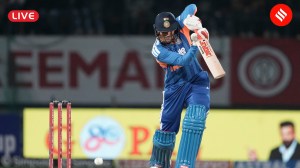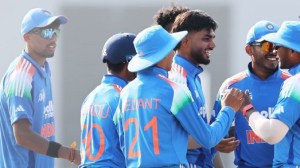Justice Rajiv Shakdher held that the exception under Section 375 (which deals with rape) of the IPC is unconstitutional, while Justice C Hari Shankar held that the provision is valid. Details of the judgment were awaited.

What happens next, and what does this verdict mean for the conversation on marital rape?
What was the case about?
The court was hearing a clutch of four petitions challenging the constitutionality of the exception to Section 375. Apart from the petitioners, who include the All India Democratic Women’s Association (AIDWA), the court heard several intervenors, including a men’s rights organisation and amicus curiae senior advocates Rajshekhar Rao and Rebecca John.
What is the marital rape exemption?
Section 375 defines rape and lists seven notions of consent which, if vitiated, would constitute the offence of rape by a man. However, the provision contains a crucial exemption: “Sexual intercourse or sexual acts by a man with his own wife, the wife not being under eighteen years of age, is not rape.”
This exemption essentially allows a marital right to a husband who can with legal sanction exercise his right to consensual or non-consensual sex with his wife.
The exemption is also under challenge before the Gujarat High Court on the grounds that it undermines consent of a woman based on her marital status. Separately, the Karnataka HC has allowed the framing of marital rape charges against a man despite the exemption in law.
Story continues below this ad
ExplainedHeaded to top court
What was the government’s stand?
Like in the ongoing case before the Supreme Court challenging the constitutionality of Section 124A IPC (sedition), the Centre initially defended the rape exception and later changed its stand and told the court that it was reviewing the law, and that “wider deliberations are required on the issue”.
Solicitor General Tushar Mehta brought to the court’s notice a 2019 committee set up by the Ministry of Home Affairs to review criminal laws in the country.
The Delhi government argued in favour of retaining the marital rape exception. The government’s arguments spanned from protecting men from possible misuse of the law by wives, to protecting the institution of marriage.
Story continues below this ad
What happens when a split verdict is delivered?
In case of a split verdict, the case is heard by a larger Bench. This is why judges usually sit in Benches of odd numbers (three, five, seven, etc.) for important cases, even though two-judge Benches or Division Benches are not uncommon.
The larger Bench to which a split verdict goes can be a three-judge Bench of the High Court, or an appeal can be preferred before the Supreme Court. The Delhi High Court has already granted a certificate of appeal to move the Supreme Court since the case involves substantial questions of law.
What is the broad takeaway from Wednesday’s verdict?
Even though the court has delivered a split verdict, its intervention moves the needle in favour of doing away with the marital rape exemption in law. Justice Shakdher’s opinion takes the conversation forward on the subject, and sets the stage for a larger constitutional intervention before the Supreme Court.
Story continues below this ad
On May 10, the Supreme Court refused to stay the Karnataka High Court order that for the first time put a man on trial for marital rape. The SC’s refusal to stay the order indicates that the higher judiciary is willing to carry out a serious examination of the colonial-era provision.
What was the Karnataka HC ruling?
The Karnataka High Court was hearing an appeal by a husband against a sessions court decision to frame rape charges brought against him by his wife. Along with charges under Section 376 of the Indian Penal Code that punishes rape, the man was charged with Sections 377 (unnatural offences), 506 (criminal intimidation), 498A (domestic cruelty), and 323 (assault) of the IPC, and Section 10 of the Protection of Children from Sexual Offences Act, 2012 for alleged sexual abuse against his minor daughter.
The man sought the quashing of the FIR, especially the charge of rape, since Section 375 specifically carves out an exception for marital rape. But the single-judge Bench of Justice M Nagaprasanna refused to interfere with the sessions court order.
While the High Court did not explicitly strike down the marital rape exception, it allowed the married man to be put on trial on rape charges brought by his wife. The husband had moved the High Court after the trial court took cognizance of the offence under Section 376 (punishment for rape).
Story continues below this ad
What is the law on marital rape elsewhere?
The marital rape immunity is known to several post-colonial common law countries. Australia (1981), Canada (1983), and South Africa (1993) have enacted laws that criminalise marital rape.
In the United Kingdom, the House of Lords overturned the exception in 1991. In their landmark decision in the case known as R v R, the Lords took the view that the time had “arrived when the law should declare that a rapist remains a rapist subject to the criminal law, irrespective of his relationship with his victim”. They also said that the verdict was not creating a new offence, rather only removing a common law fiction that has its roots in ecclesiastical law.
It was argued that the House of Lords decision amounted to a retrospective change in criminal law, which would amount to a breach of the European Convention on Human Rights. The European Court of Justice reviewed the ruling and upheld the decision of the Lords as a “foreseeable evolution” of the law.
Subsequently, in 2003 marital rape was outlawed by legislation in the UK.
Story continues below this ad
Newsletter | Click to get the day’s best explainers in your inbox








































